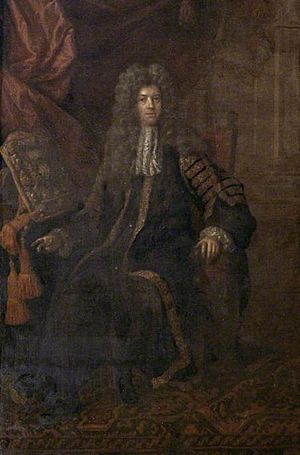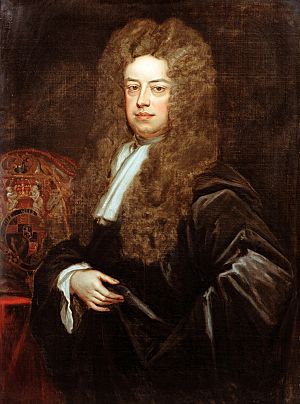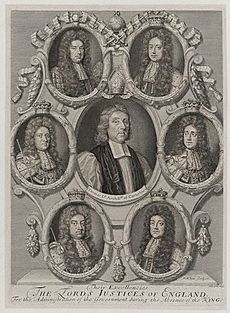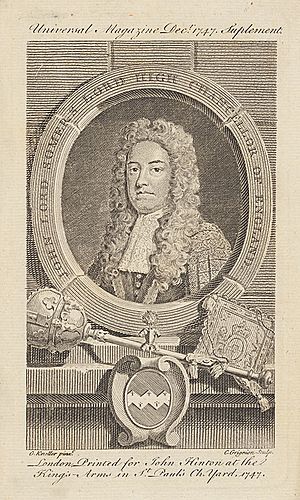John Somers, 1st Baron Somers facts for kids
Quick facts for kids
The Lord Somers
|
|
|---|---|
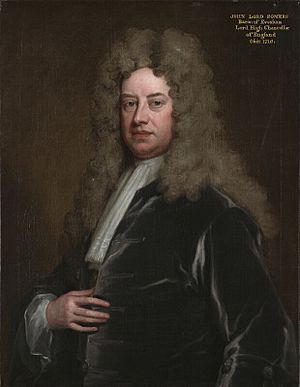
Portrait by Godfrey Kneller
|
|
| Lord President of the Council | |
| In office 25 November 1708 – 21 September 1710 |
|
| Preceded by | The Earl of Pembroke and Montgomery |
| Succeeded by | The Earl of Rochester |
| Lord Chancellor | |
| In office 1697–1700 |
|
| Preceded by | Himself (as Lord Keeper) |
| Succeeded by | In Commission |
| 11th President of the Royal Society | |
| In office 1698–1703 |
|
| Preceded by | Charles Montagu |
| Succeeded by | Isaac Newton |
| Lord Keeper of the Great Seal of England | |
| In office 1693–1697 |
|
| Preceded by | In Commission |
| Succeeded by | Himself (as Lord Chancellor) |
| Personal details | |
| Born | 4 March 1651 Claines, Commonwealth of England |
| Died | 26 April 1716 (aged 65) North Mymms, England |
| Political party | Whig |
| Alma mater | Trinity College, Oxford |
| Occupation | Lawyer, politician |
John Somers, 1st Baron Somers (born March 4, 1651 – died April 26, 1716) was an important English lawyer and politician. He was a member of the Whig party. Somers first became well-known during the trial of the Seven Bishops. He helped defend them in court.
He wrote many papers about politics. These papers explained his Whig ideas. He believed Parliament should have a strong say in who becomes king or queen. Somers played a big part in shaping the rules after the Glorious Revolution of 1688. He served as Lord Chancellor under King William III. He also helped create the union between England and Scotland in 1707. He was a key leader of the Whig party for 25 years after 1688.
Contents
Early Life and Education
John Somers was born in Claines, near Worcester. He was the oldest son of John Somers, a lawyer. His father had supported Parliament in earlier conflicts.
John went to school at Queen Mary's Grammar School, Walsall and The King's School, Worcester. Later, he studied at Trinity College, Oxford. He then trained to become a lawyer. He learned from Sir Francis Winnington. Somers joined the Middle Temple, a famous place for lawyers.
Starting His Political Career
Somers quickly became friends with important political leaders. These included Lord Essex and William Russell. He wrote a pamphlet supporting the Exclusion Bill. This bill aimed to prevent the king's Catholic brother from becoming king.
In his writing, Somers argued that Parliament had always had the power to decide who would inherit the crown. He showed that English kings were sometimes chosen by election. Even after the Norman Conquest of England, Parliament had removed kings. Kings also had to confirm their right to rule through Parliament.
Somers believed that Parliament had the right to limit who could become king. He wrote that "seldom or never the third Heir in a right descent enjoyed the Crown of England." This meant that the crown often did not pass directly from father to son for many generations.
He also wrote about the importance of grand juries. These juries decide if there is enough evidence for a trial. Somers argued that juries must follow their own judgment. They should not just listen to what judges tell them. He said that kings must ensure justice is done fairly. He also believed that protecting innocent people was more important than punishing the guilty.
In 1683, Somers became a well-known lawyer. His fame grew even more during the trial of the Seven Bishops. He was a junior lawyer for the defense. One bishop thought he was too young. But another lawyer, Sir Henry Pollexfen, insisted Somers join them. He said Somers would work hard and know all the past legal cases.
During the trial, Somers spoke for only a few minutes. But his words were very powerful. He quickly became known as a great speaker and a smart lawyer. He argued that the bishops' petition was not illegal. He said they had a right to ask the king for help when they felt wronged.
The Glorious Revolution
John Somers played a key role in the secret plans for the Glorious Revolution. This was when King James II was removed from power. Somers was elected to the Convention Parliament (1689) for Worcester. He helped lead discussions between the two houses of Parliament. They debated if King James II had given up his throne. They also discussed if the new Parliament's actions were legal.
In his first speech in Parliament, Somers argued that James II had lost his right to be king. He said James had tried to change the country's laws. He had also broken his promise to the people. Somers used the word "abdicate" to describe James's leaving the throne. This word meant James had given up his power.
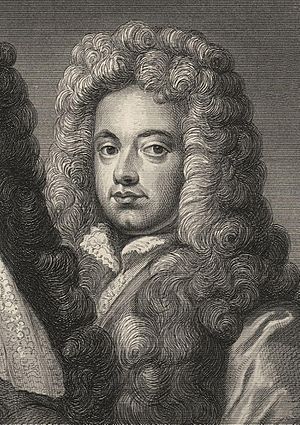
Somers helped create the Declaration of Right. This document listed the rights and freedoms of English people. It later became the Bill of Rights 1689. This law was very important. It limited the power of the king and queen. It also gave more power to Parliament. Somers argued that this law protected people from unfair rule. He believed it was vital for the country's freedom. He stressed that even kings must follow the law. If they don't, they lose their right to rule.
A Career in Government
In May 1689, Somers became the Solicitor General for England and Wales. He became a trusted advisor to King William III. He helped solve disagreements between the two houses of Parliament. He also helped restore rights to towns that had lost their special permissions from the king.
Re-elected as an MP for Worcester in 1690, Somers helped pass a law. This law made all the laws passed by the new Parliament legal. As Solicitor General, he handled some important legal cases. He was fair and kind, unlike lawyers in earlier times. He was later made Attorney General for England and Wales.
On March 23, 1693, Somers was appointed Lord Keeper of the Great Seal of the Realm. This was a very important legal position. He was also made a knight and a member of the Privy Council. Somers became a leading member of the Whig Junto. This was a small group of powerful Whig politicians.
When King William went to the Netherlands in 1695, Somers was one of seven Lords Justices. These justices managed the country while the king was away. Somers also helped King William and Princess Anne become friends again.
In April 1697, Somers became Lord Chancellor. He was also given the title Baron Somers, of Evesham. This made him a peer, a high-ranking noble. He wrote a famous paper arguing against reducing the size of the army. He believed a strong army was needed to protect the country.
Somers faced some challenges in his career. He was criticized for his connection to a sea captain named William Kidd. He was also criticized for accepting land from the Crown. In 1701, he was accused of wrongdoing by the House of Commons. This process is called impeachment. He defended himself very well. The House of Lords dismissed the charges against him. After the king died, Somers mostly retired from public life.
Later Years and Legacy
Somers was the President of the Royal Society from 1698 to 1703. This is a famous group for scientists. He also helped pass the Act of Union 1707. This law officially joined England and Scotland to form Great Britain. He also helped pass a law to improve how courts worked.
In 1708, he became Lord President of the Council. He held this job until 1710. Even though Queen Anne didn't like the Whig party, she grew to like and admire Somers. People said he was very charming and polite.
Somers died on April 26, 1716. He never married. His family name continued through his sister's children.
John Somers is remembered as a very important figure in English history. He is honored in St Stephen's Hall in Parliament. Many people in the 1700s saw him as the main person who shaped the rules for who would become king or queen. Famous politicians like William Pitt the Elder admired him. Pitt said he learned his political ideas from Somers.
The historian Thomas Macaulay praised Somers highly. He called him one of the greatest men of his time. Macaulay said Somers was a brilliant lawyer and politician. He was also a great speaker and writer. He was known for his calm wisdom and honesty. Somers was a strong supporter of Whig ideas throughout his life.
The town of Somers, Connecticut in the United States was named after him in 1734.
|
 | Aurelia Browder |
 | Nannie Helen Burroughs |
 | Michelle Alexander |


